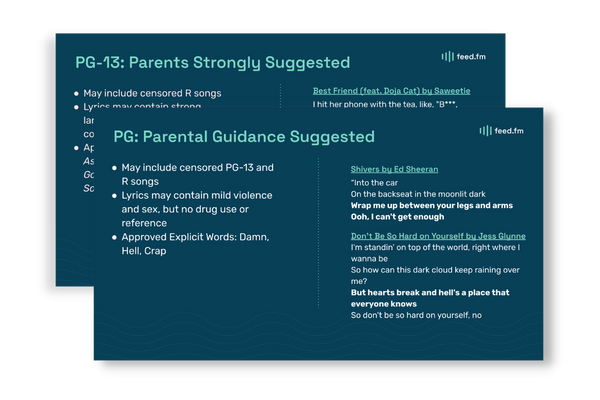Clean vs. Explicit - Feed.fm's New Music Rating System

Have you ever been listening to music with your child, only to realize just how many of your favorite Rihanna and Dua Lipa songs contain explicit lyrics? Sure, the FCC regulates profanity and obscenity for radio and TV, but most of us listen to music via streaming these days. And you don’t have to be a parent to marvel at how explicit music has become, even in today’s pop songs. If you are a product leader, production manager, or content director charged with sourcing music for business use, navigating clean vs. explicit music content for your brand might seem even more daunting.
As the Music as a Service (MaaS) partner for more than 75 health and fitness brands, we’re highly attuned to identifying profanity, experienced at working with censored songs, and we know just how to find clean versions of our customers’ favorite tracks. With each of our business partners, we have candid conversations to ensure their music stations adhere precisely to brand guidelines and end-user preferences. In fact, we employ a Customer Support Team whose quality assurance (QA) process—in which they listen to approximately 4,000 songs each month—includes profanity compliance.
Here are three terms that can make or break our success as curators:
- Clean
- Explicit
- Censored
But what exactly does explicit mean in music?
These terms—referred to as ”metadata” in the music industry—ideally communicate that a) a “clean” song contains no profanity, b) an “explicit” song contains profanity, and c) a “censored” song originally contained profanity, but these words have been rendered inaudible. However, there is no universally accepted list of words or themes deemed to be explicit or profane, and the metadata is supplied voluntarily by music labels in wildly inconsistent ways. With no clearly defined explicit rating system in place within the music industry, we set out to create our own to better serve brands streaming music for business purposes.
Establishing an effective explicit music rating system
Over the course of streaming over 700 million songs last year, we realized the disparity in explicitness metadata was hindering our ability to deliver music stations efficiently and consistently. So our curation team undertook a months-long effort to develop a proprietary rating system. We now have a firsthand appreciation of why no other streaming service (to our knowledge) has undertaken such a challenge before.
Thanks to the new Feed.fm Music Rating System, every song in our customers’ stations is now:
- Categorized first as Clean, Explicit, or Censored based on the specific words, and
- Further categorized with an MPAA-style rating of G, PG, PG-13, R, or NC-17 based on words and themes (sex, drugs, and/or violence).
The bottom line? The Feed.fm Music Rating System better aligns us internally and externally, adding an extra layer of precision in our QA process and in the custom music stations we deliver to our customers who are streaming music for business purposes. Instead of just discussing a list of dirty words, we are able to have a more comprehensive discussion with brand stakeholders, and provide guidance and resources to help them select the appropriate music ratings for each unique use case. And finally, we are able to offer our customers peace of mind so that they can rest assured that the music they are streaming in their app matches their brand values.
Common questions about explicit songs and the Feed.fm music rating system
We recently hosted a “Clean vs. Explicit” customer webinar to describe how the Feed.fm Music Rating System works. Here are some frequently asked questions thus far.
What music ratings do most businesses choose?
Not surprisingly, most of our customers select either PG or PG-13 for their music stations. While there are instances when G, R, or NC-17 are preferred, the fluidity of current work/home life norms means that most customers gravitate towards the more family-friendly end of the music spectrum.

Are alternate versions or censored songs generally available?
Overwhelmingly, yes. Especially for today’s Top 40 and pop hits, there are usually censored versions of songs that our curation team can use to ensure that stations stay fresh and relevant while remaining consistent with the music rating preferences of our business partners. We have a lot of experience when it comes to finding clean or censored versions of explicit songs. We sometimes have to get creative with hip hop stations—there may be instances where singles have censored versions, but non-singles do not. We keep close tabs on the newest releases to ensure we don’t miss out on any possibility of delivering hit songs to end users.
I noticed that the following words are categorized as explicit within Feed.fm’s Music Rating System: damn, hell, and crap. Why is this?
Admittedly, these words are not viewed as explicit in some peoples’ opinions. We know that in many cases they are acceptable and should not be censored. However, in constructing our rubric, we intentionally set the explicitness threshold as low as possible. This enables us to efficiently and confidently deliver squeaky-clean music stations to the youngest, most highly selective demographic. Indeed, most of the stations we curate include a degree of explicit lyrics, with our five-level rating framework dialing in the cuss and content with great precision for our customers.
The art and science of music curation for businesses.
It’s definitely the case that music curation is part art and part science. The construction of Feed.fm’s Music Rating System for businesses relied heavily on art. Now we’re excited to continue translating this into reality using the unique new science of the rubric we’ve specifically developed for music.
Talk to a music specialist at Feed.fm to learn more about the Feed.fm Music Rating System and how it can work for your brand.


 2 min
2 min